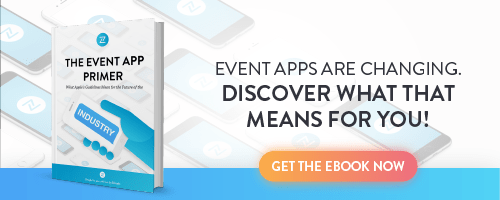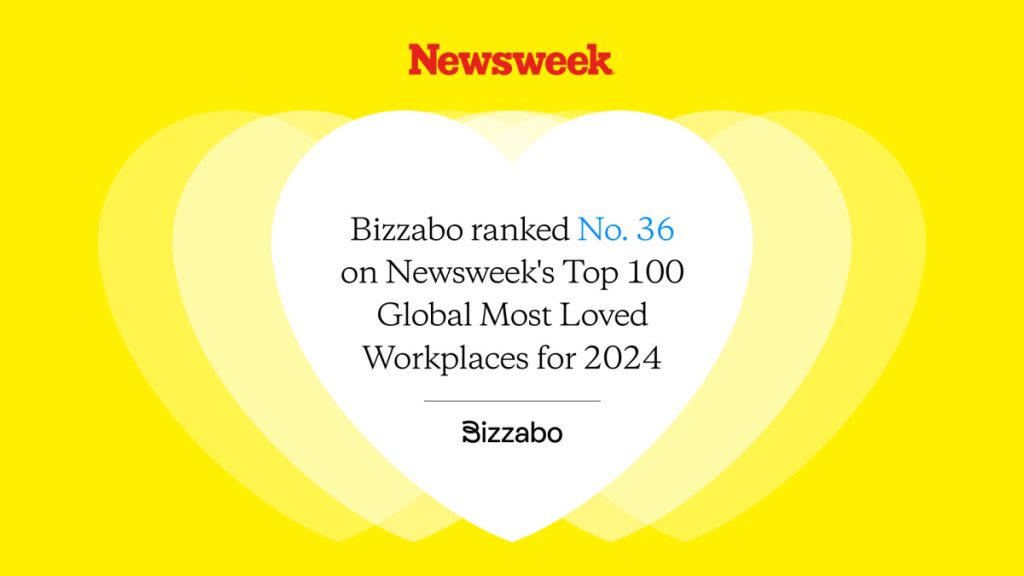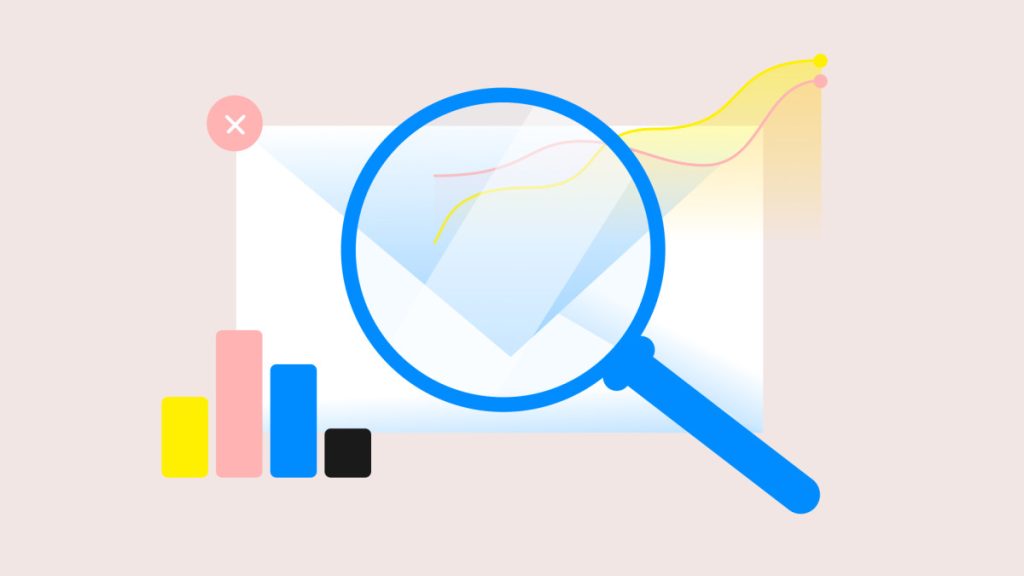Increasing Event App Adoption: The Complete Guide
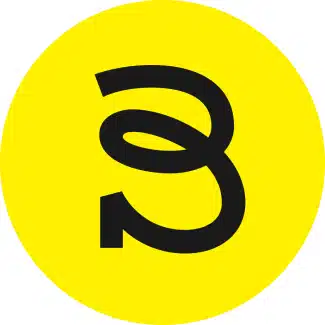

Your event app is a critical component of your event. In this guide you will learn how to increase mobile adoption and get more out of it.
In an industry that is becoming increasingly mobile-first, it only makes sense that mobile apps have become an important asset for event organizers. According to study conducted by Event Manager Blog, 53% of event professionals already use an event app. The impact of using an event app are also obvious to see. A study from Global Experience Specialists shows that 91% of event planners who have incorporated an event app have experienced positive event ROI. In a more recent study conducted by Bizzabo, over 80% of respondents said they used an event app for the events that they organize.
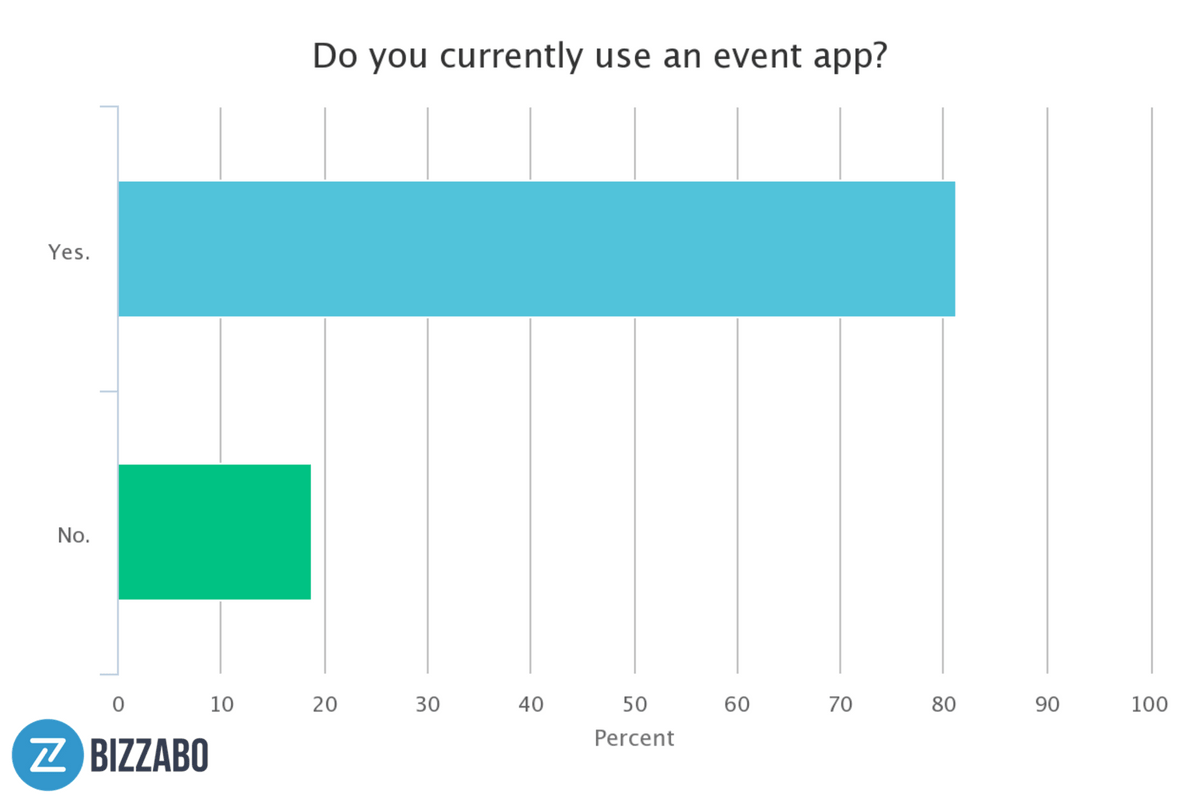
As these trends continue to grow, the challenge is not only to develop a great mobile app but also to devise a thoroughly effective event app adoption strategy. There are few things more frustrating for an event marketer than investing thousands of dollars into an event app and seeing very low adoption rates.
But before we dive into specificstrategies, it is worth establishing the definition of the event app, different type of event apps, as well as specific App Store guidelines that will play a large role in determining the future of event apps.
What is an Event App?
An event app is a specific mobile application that attendees download prior to arriving at the event. Event apps are essential for communication between attendees, especially before the event start date. They serve as a networking platform through which people can connect with one another so they can better formulate their go-to-event strategy. The purpose of the event app is to enhance the event through a more intuitive, collaborative, and digital-friendly experience.
Below you can find how Bizzabo defines the value of its event app.
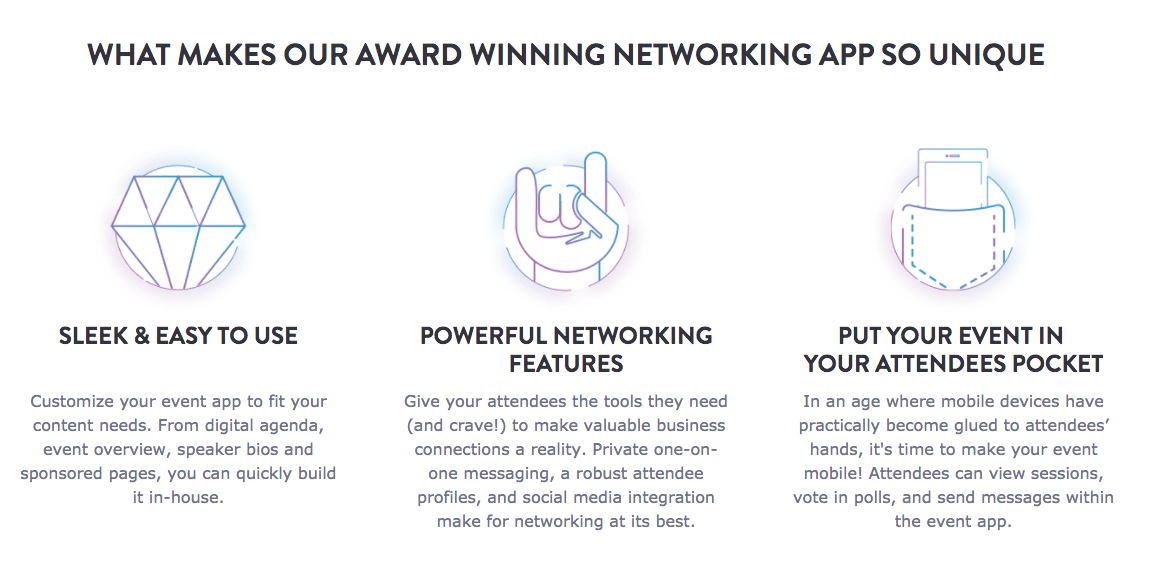
Event apps are an all-in-one content hub where the event agenda, session schedule, speaker bios, and surveys can be found in a single app. A quality app oftentimes results in a positive overall event experience for attendees.
To further understand the world of branded event apps, let’s go through a quick breakdown of the three major types of apps that you will be choosing from.
- Custom-Made Private Label Mobile Apps – Custom-made “white label” (client-branded) apps are apps that are created from the ground-up to the specifications of a client. They may use some templated code, but the bulk of their structure and source code is tailor-made. However that uniqueness comes with a higher price, a longer development cycle and the need to have each app submitted, approved and published in the App Store.
- Branded Universal Apps – Just like a universal remote might be in charge of your home entertainment system, a universal app aims to be your one-stop-shop for events. Clients download the universal app which then contains their specific event or event series. Universal apps are the ideal compromise between a complete tailor-made solution and a replicable structure that can be applied to your other events. For reasons we’ll dive into later, we believe branded universal apps will be the most widely selected option in the events space.
- Templated Private Label Mobile Apps – With templated Private Label Mobile Apps, clients get a great branded experience and access to a variety of modules, but at the cost of uniqueness in both design and functionality. In fact, the ease at which these Private Label Mobile Apps could be reproduced was the reason for Apple’s recent App Store update. This new guideline has very large implications for the future of templated Private Label Mobile Apps, as delineated in the following section.
The Future of the Event App Landscape
At Apple’s 2017 World Wide Developer’s Conference (WWDC), the brand released several updates to their App Store guidelines. The one that is particularly relevant to event technology stakeholders is Guideline 4.2:
Your app should include features, content, and UI that elevate it beyond a repackaged website. If your app is not particularly useful, unique, or “app-like,” it doesn’t belong on the App Store. If your App doesn’t provide some sort of lasting entertainment value or is just plain creepy, it may not be accepted.
Getting more into the specifics, Guideline 4.2.6 was newly announced in 2017 and has huge implications for event app developers:
Apps created from a commercialized template or all generation service will be rejected.
This new addition has been interpreted in different ways but for the most part, many in the industry anticipate that Private Label Mobile Apps will no longer be the norm in the events industry. Apple wants to prevent the App Store from becoming bloated with repetitive, one-and-done applications that do not add value to the app ecosystem so it makes sense for them to roll out this new rule.
The Case for The Branded Universal Event App
Given the new guidelines rolled out by Apple, the challenge is now to invest in the type of app that will maximize event success while still adhering to the new app stores rules. Considering these factors, it seems that the branded universal event app will be the solution that makes most sense for event professionals. Here are a few reasons why the branded universal app will be best for increasing event exposure.
1) Better Attendee Adoption: All of the contacts that an attendee creates in an event app at one conference are deleted with the rest of the app once the conference is over. A universal event app provides an alternative. It designates one “conference app” for attendees to use for all of their conference needs and increases the chance that they will digitally engage with your event.
2) Cross-event Analytics for the Event Organizers: Event apps provide organizers with an unparalleled method of gathering data about their attendees. With a universal event app, organizers can easily compare all of their event data through one easy-to-read program. Everything from most popular sessions to most popular attendees can be tracked and compared across your year-long event line-up.
3) Cost-effective While Still Remaining Branded: Branded universal apps give you the greatest return for your investment. As mentioned above, universal apps can be designed to provide attendees a branded experience from the sign-in screen. Custom-made Private Label Mobile Apps are not only expensive to create but they are expensive to maintain, as vendors often charge for support. Plus, once the benefits of having a universal app integrated with an all-in-one event success platform are added in, an event organizer’s return on investment skyrockets to even greater heights.
It is important to have a firm understanding of the event landscape and the future of event apps before formulating the perfect event app adoption strategy. Now that the major points have been covered, let’s explore the different ways in which you can increase your event app adoption rates.
Defining Your App Adoption Goals
Formulating a sound event adoption strategy requires you to articulate your definition of event success. App adoption can mean many different things. Are you specifically focused on how many times your app is downloaded? Perhaps the number of messages sent within the app is a more important metric? How about the number of times each page is viewed? If you are able to clearly establish your goals, you are more likely to increase the event app adoption rates as well as construct an effective mobile marketing strategy. The following are a few examples of metrics you can focus on.
- Downloads – This metric can be seen as the “first domino” because it is impossible to measure any of the other metrics if the actual event app has yet to be downloaded. The early stages of your app promotion campaign should focus on driving downloads—but by no means is this the only important metric.
- Messages Sent/Received – This metric displays the extent to which the app is used as a form of communication. If these number are lower than you would like, think of creative ways to encourage more communication through the platform.
- Page Views – Because the app is also a hub for event content, it is worth measuring the amount of times each type of page is viewed. This will also give you a good idea of which pages are most popular among attendees, helping you to better structure your app for future events.
Below you can find a screenshot of the Bizzabo dashboard that measures all of these app metrics. By having these metrics readily available, you’ll be able to better articulate your mobile marketing strategy as well as improve upon it for the future. (Of course, there are many other event metrics to consider, as well.)
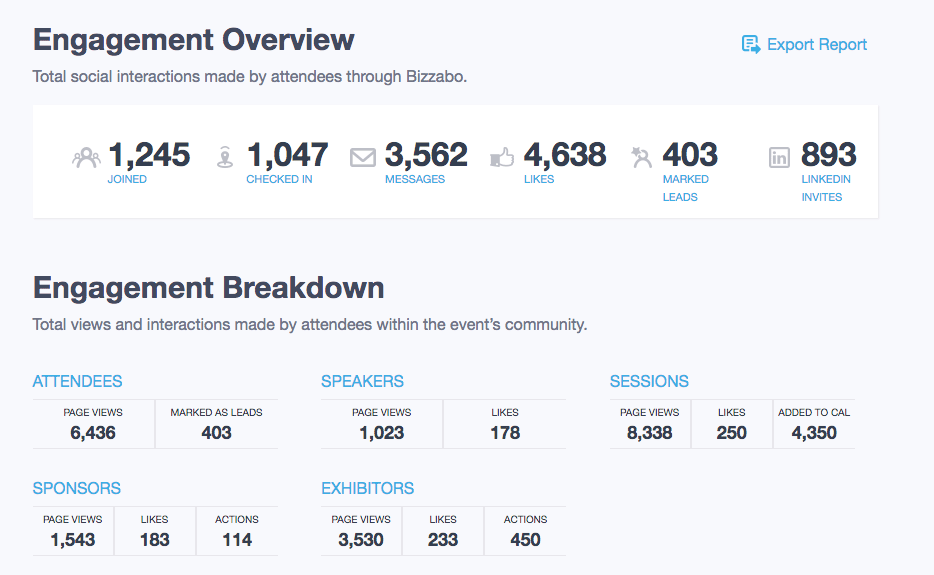
Devising A Mobile App Marketing Plan
Now that we’ve explored the different ways to define event app adoption success, we’ll dive into the ways in which you can achieve this success. A sound mobile app marketing plan consists of several different factors. The important thing is to formulate a gameplan that best suits your needs and definition of success. The following strategies comprise some of the most proven methods for improving event app adoption rates.
Remember: Make sure to formulate a gameplan that aligns most closely with your definition of success.
- Get Started Early Promoting an event networking community involves diligence. You’ve got to engage your attendees early in order to see widespread platform adoption. Intuitively, this should make sense, just after an attendee registers for an event – the event is still fresh in their mind and they are motivated to make the most out of the investment they’re making – whether that investment is time, money or both.
- Utilize Email Campaigns
Send a dedicated email to every registered attendee with a clear call to action to download your event app. If you bury your attendees with a barrage of links and information, the call to action to download your event app will be lost. Use CTA customization to attract the attendees’ attention and emphasize the company’s branding.
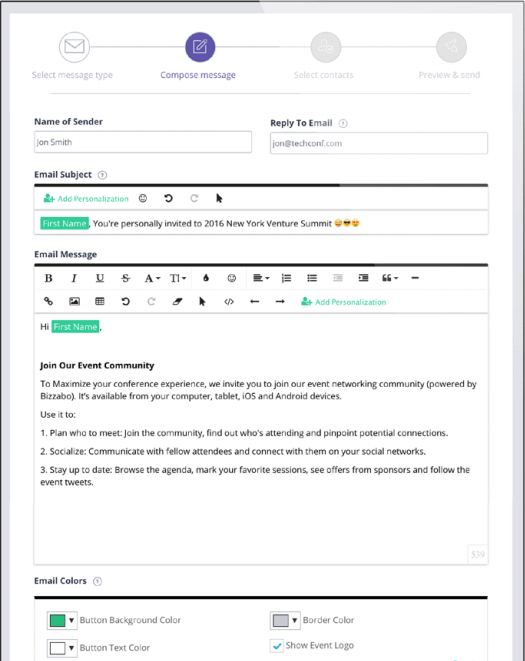
Keep in mind, attendees are busy and often times do not open all of the emails you send them. Send a 2nd email to those who haven’t opened or clicked on your event app download email. To maximize open rates of your emails, don’t forget to use the personalization in the email subject line. For the best email performance, make sure that you effectively segment your emails and personalize them.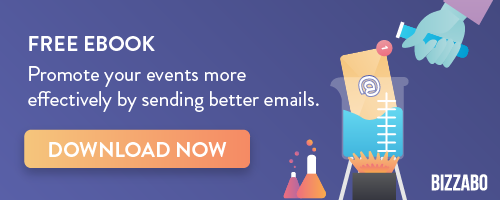
- Create a Social Media Strategy
Start promoting your event app’s download links on Twitter, Facebook, and LinkedIn (plus any other networks your attendees use such as Snapchat and Instagram) as early as possible and keep promoting until your event has ended. There is no such thing as too early.
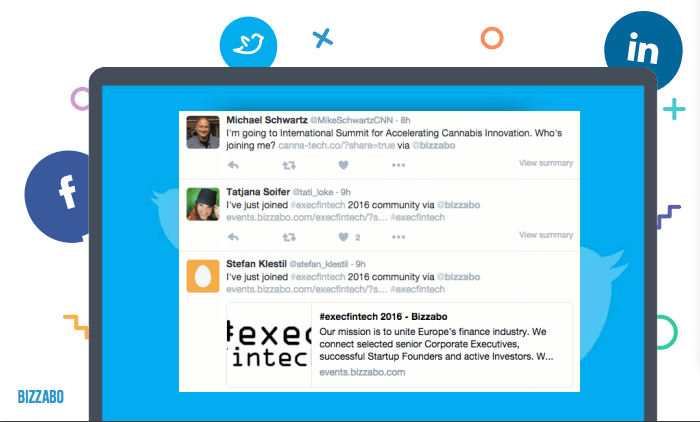 Monitor your attendees on social media and interact. For example, if an attendee is asking ‘who else is going to attend’? reach out to them, letting them about your event app and how to join.
Depending on the size of the event, you might want to consider investing a bit of your budget on sponsored ads in a social network to increase event app adoption rate. The number of attendees joining the event app will grow with the amount of muscle you put behind promoting it!
Monitor your attendees on social media and interact. For example, if an attendee is asking ‘who else is going to attend’? reach out to them, letting them about your event app and how to join.
Depending on the size of the event, you might want to consider investing a bit of your budget on sponsored ads in a social network to increase event app adoption rate. The number of attendees joining the event app will grow with the amount of muscle you put behind promoting it!
- Let Your Attendees and Speakers Promote on Your Behalf
The best event organizers don’t stop at promoting the event networking community after they’ve optimized the event website, sent emails and posted on social media. They also use event goers as evangelists who encourage other attendees to join the community as well. Below you can see the breakdown of speaker profile engagement within Bizzabo’s event app dashboard. Use data like this to strategize which speaker would be the best evangelist for your app.
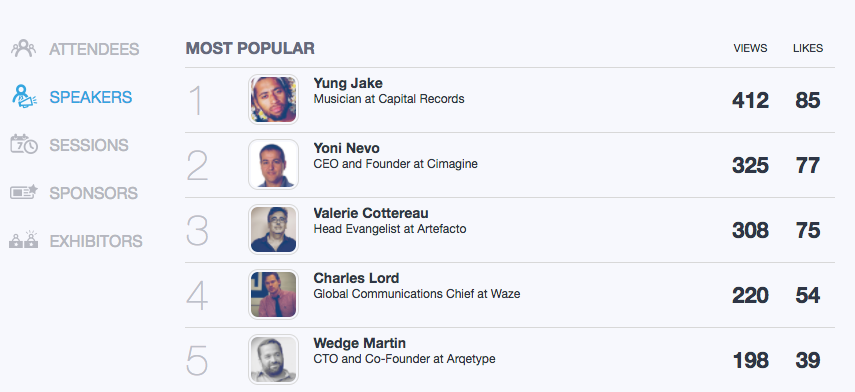
Make it easy for attendees to promote your event and app by providing easy-to-use sharing buttons with pre-populated text. That way, attendees can let their networks know that they’ve joined the event networking community and that their fellow attendees should too!
- Leverage the Momentum on Event Day
Keep in mind that your mobile marketing strategy does not end once the event date arrives. In fact, the mobile app marketing plan reaches its peak during the actual event because this is when the app will be most widely used by your attendees. Below are some helpful tips to help you achieve high on-site adoption.
- Create signage near the event check-in area promoting the networking platform and telling attendees how they can download the app. Include a QR code attendees can scan to download the app and also include the event hashtag.
- Brief your staff about the event app and create a “networking community” expert. That way if attendees want to know a few specifics about the platform, you can answer their questions.
- Make announcements (on stage and via push notifications) to remind attendees of the value of using your event app
- Approach your attendees. Don’t be afraid to ask them to download it face to face.
- Promote on stage with backdrops and signage
Conclusion
As event apps continue to influence the industry of live events, your mobile app marketing plan will continue to evolve as well. This guide was written to help you devise the best possible strategy for your mobile app promotion that will result in higher event app adoption rates. There is no way of knowing what the next major shift in the event app space will be, but the best thing to do as an event professional is to continue learning about the trends and best practices through content such as this blog post or this event app ebook you can download for free. We hope this guide will continue to be helpful along your journey to executing the best event app strategy.
Note: This guide will periodically be updated with the latest in event app adoption trends. In the mean-time, click the below button to access more helpful event resources.
